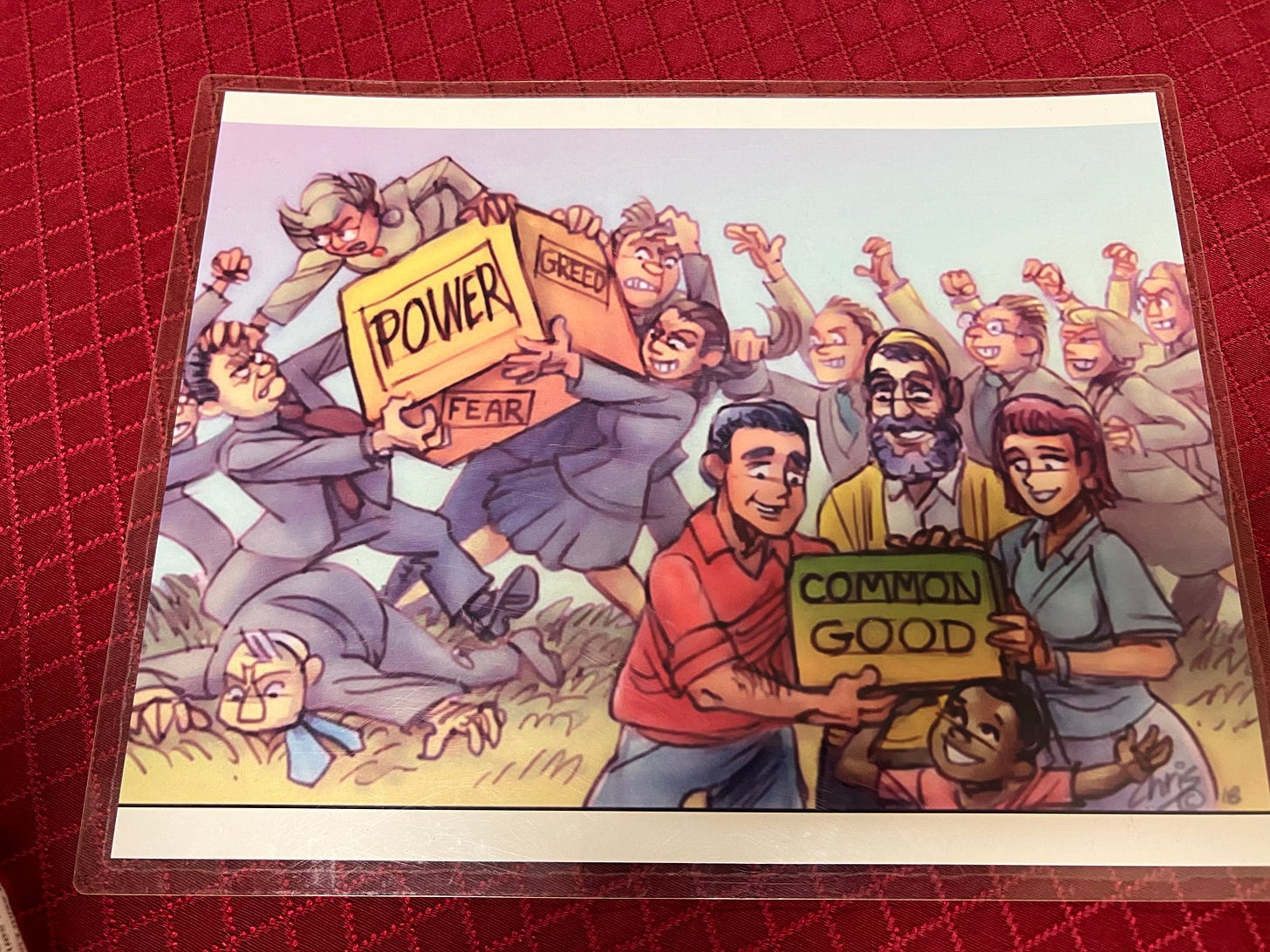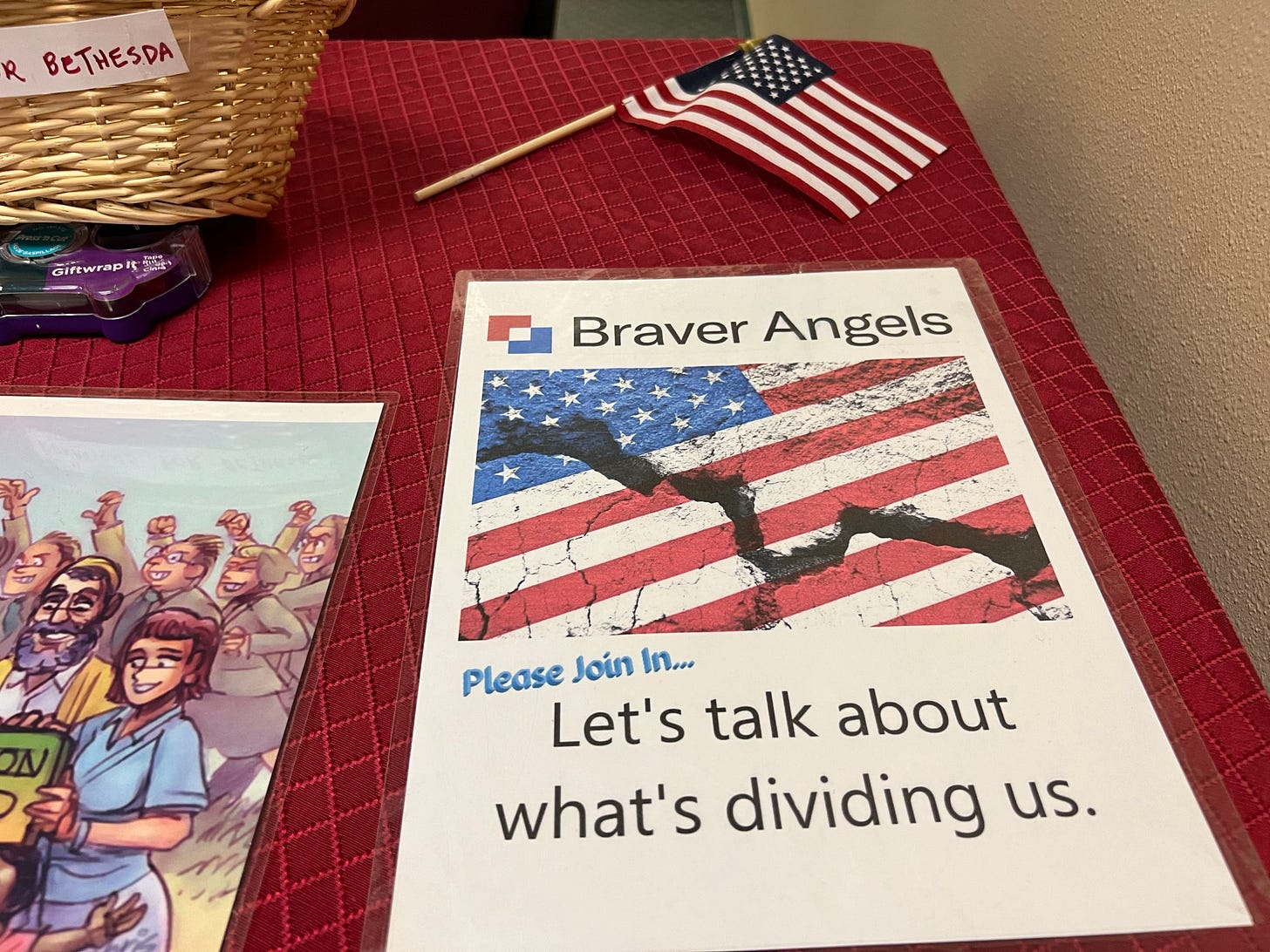I don’t like that man. I must get to know him better.
—Abraham Lincoln
IT’S THE EVENING of March 25 and we are gathered in a room at Eugene’s Bethesda Lutheran Church, which is not sponsoring this event, just loaning the space. The meeting has no spiritual thrust to it. In fact, what has brought together the 33 people sitting in a giant circle isn’t anything we have in common, spiritually or otherwise, but what we don’t have in common.
We are here because of our differences. Specifically, political differences.
“Braver Angels began in 2016, shortly after the election,” begins Mary Miller, a co-facilitator of the nonprofit’s Southern Willamette Valley Alliance, “with eight people who’d voted for Hillary and eight who’d voted for Trump. The three people who started the organization felt we needed to do something about the division between people. After the initial meeting, those who attended were surprised that friendships came out of the group. After subsequent meetings, surveys showed that those who attended felt differently about each other—felt better about each other—simply by listening to each other.”
Cynics, of course, may already be rolling their eyes. Given the Grand Canyon-wide chasm in America between those on the right and those on the left, the idea that small groups like this might narrow the divide might seem ludicrous. I mean, the culture war is being fought 24/7 at Star Wars levels: at Trump rallies, Biden speeches, Congressional hearings, podcasts, TV news and social media outlets, many of whose goals—admitted or not—is not to unite but to divide.
Against such powerful forces, isn’t Braver Angels an idealistic attempt at the unattainable?
After attending the two-hour session, I’d say no. The journey of a thousand miles begins with a single step. And bravo for Braver Angels for stepping up to provide a way to help people with different points of political views understand each other better.
But, then, I’ve had a predisposition toward this kind of thinking for at least 30 years. In 1992, I wrote a front-page piece for The Register-Guard called “The Wall.” Its theme was the divide between Christians and non-Christians and how, because we each lived our lives in bubbles, we seldom got to know, or understand, each other. In the absence of understanding, we filled the void with stereotypes about each other because it’s easier to not engage than to engage. Easier to not be curious about one another than to be curious. Easier to talk, or shout, than to listen.
Braver Angels seems to recognize as much, and is doing something about it. (Its name is rooted in President Abraham Lincoln’s plea for post-Civil War unity, though his call was to find the “better angels” in us. However, another current-day organization had dibs on that name; thus the alteration to “braver.”) Its goals are to reduce polarization, help people develop communication skills, reinforce traditional values such as honesty—remember that?—and bridge divides, knowing that “our differences make us stronger.”
Look, I’m a realist; change takes time, commitment and humility. But I’m also an optimist; you have to start somewhere, and so when Miller, for an ice-breaker, asks us to turn to the person next to us and share something “we do for recreation,” I do. Dave, the guy I’m next to, starts right in about his love for Oregon State football. I give him a few-sentence overview of my fondness for sailing, hiking, Yachats and used bookstores.
I have no idea where Dave is politically and he has no idea where I am; although when registering, we were each asked to describe ourselves in terms of “Blue,” “Red” or “Other,” we wear only name tags, not color-coded designations. But in the next exercise, I sense an inner tension when we’re asked to stand and move to a particular side of the room based on a series of questions, some as light as how we prefer to load toilet paper (over or under?), some as serious as “Life begins at conception/Life begins at birth.” Among the others: “Social change is happening too fast/Social change is happening too slow,” “I vote for someone/I vote against someone” and—paraphrased— “Covid vaccines were necessary/Covid vaccines were forced on us.”
What I find petrifying about this exercise is that, at 70, I’m not particularly political, not convinced that we are the sum of our political leanings and not prone to make politics the focus of any conversation. Over the years, I’ve been a Republican and a Democrat, and am currently registered as an Independent, a reflection of my sense that both parties are flawed and neither offers a values menu that fits my tastes.
As a Christian, I’ve long believed that my identity should be in Christ, not in a political party, and said so in my 2021 book Cross Purposes: My Struggle to Reconcile the Peace of Christ with the Rage of the Far Right. I was among one in five evangelicals who did not for Donald Trump in 2016 or 2020.
In short, I’m complicated, spiritually and politically, and this Braver Angels exercise is emerging as my worst fear. People are so much more than their stance on this or that issue and suddenly we are being asked to visually “sort” ourselves through only political values—as if this alone defines us.
Keep reading with a 7-day free trial
Subscribe to Bob Welch: Heart, Humor & Hope to keep reading this post and get 7 days of free access to the full post archives.






